The government of The Gambia and the Economic Community of West African States (ECOWAS), with support from the Office of Global Criminal Justice of the US Department of State, on February 29 launched the inaugural meeting of their Joint Technical Committee (JTC) on the establishment of an internationalised Court for the prosecution of perpetrators of gross human rights violations carried out during the tenure of former Gambian President Yahya Jammeh.
The JTC is tasked with drafting a treaty between The Gambia and ECOWAS for the establishment of the Court, setting out the terms of cooperation between The Gambia and ECOWAS, proposing a budget for its operation and an implementation plan. The 11- person JTC comprises representatives of the Ministry of Justice (3 – Solicitor-General plus two Legal Counsels), the Ministry of Foreign Affairs (1), the Judiciary (1), The Gambia Bar Association (1), the Alliance of Victim-led Organisations (1), and ECOWAS (4 – 3 from the Commission and 1 from the Court of Justice). The JTC is co-chaired by the Solicitor-General / Legal Secretary of The Gambia and the Head of Legal Affairs of the ECOWAS Commission.
The Court to be established will be internationalised or “hybrid” in nature meaning that it will be comprised of Gambian and non-Gambian judges and will be based in The Gambia but with the power to hear cases abroad. It will have two chambers, one for trials and one for appeals, and will have jurisdiction over international crimes and those it is not possible to try under Gambian law. The Minister of Justice highlighted The Gambia’s unwavering resolve to confront the dark past and ensure justice by prosecuting those responsible for human rights violations. He said that the JTC would have 18 weeks (e.g., until the middle of July) to complete the legal framework but insisted that it would move more quickly if possible. The Minister also indicated that a zero draft of the treaty had already been drafted, which was the focus of the JTC’s inaugural meeting.
The Ministry of Justice will this weekend begin sensitisation meetings with the National Assembly on draft bills to establish a Special Prosecutor’s Office (SPO) within the Ministry and a Special Accountability Mechanism (SAM) that will provide the legal framework for prosecutions going forward. The Ministry hopes the bills can be debated during the parliamentary session to begin in March and is considering organising a special session of parliament to ensure that this is done.
During her opening remarks, the US Ambassador-at-Large for Global Criminal Justice, Dr. Beth Van Schaack, congratulated The Gambia for having made “so much progress in such a short period of time” and said that she refers to The Gambia as a good news story to inspire other countries that are struggling with transitional justice processes. She added that, to be successful, a transitional justice process must be victim- and survivor-centred, emphasising that “Jammeh must face justice.”
The establishment of the Court will be a positive development towards implementation of the TRRC recommendations. This is also crucial in setting a good example for other jurisdictions in West Africa grappling with transitional justice and prosecution of alleged perpetrators of human rights crimes/violations. Responding to media questions, the Minister of Justice informed that there is no extradition treaty between The Gambia and Equatorial Guinea, however the Hybrid Court will be in a position to try Jammeh outside the Gambia as this has been a concern for many victims and their families. Ensuring the process is victim centric/friendly was highlighted during the meeting – a recommendation that was also made by the Special Rapporteur on the promotion of truth, justice, reparation and guarantees of non-recurrence and the Universal Periodic Review (UPR). The Minister highlighted the issue of capacity, which is a genuine concern. The Court will require staff (including in trial/appeal chambers and protection of victims) with the required technical capacity including ensuring a gender responsive approach to prosecutions.





